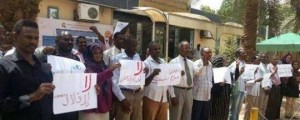Sudan: Journalists protest against repression
 Numerous journalists gathered in front of the premises of the National Council for Press and Publications (NCPP) in Khartoum on Sunday to express their dissent against several limitations the state has imposed on the press.
Numerous journalists gathered in front of the premises of the National Council for Press and Publications (NCPP) in Khartoum on Sunday to express their dissent against several limitations the state has imposed on the press.
According to local sources, the group delivered a memorandum to the council demanding protection from attacks by the National Intelligence and Security Service (NISS). The journalists claim the authorities are attempting to illegally limit the scope of their coverage and thereby indirectly control what they write about.
Human rights advocacy groups have accused the Sudanese government of attacks on dissenting publications; leading to their closure or the withdrawal of their operation license.
On Press Freedom Day, Human Rights Watch reported that the Sudanese government has increased its censorship of the media. Reports indicate that at least one editor has been forced to resign this year. Despite the official declaration of an end to the government’s pre-censorship program, journalists say they continue to receive directions not to cover some stories. Officials have also confiscated copies of newspapers deemed to have violated the state’s directions.
Last month, President Omar al Bashir accused some publications of circulating stories that undermine national security and create division. He went on to caution journalists not to cross the “red lines”.
However, the protesting media personnel are questioning where this ambiguous “red line” begins and ends.
Last month, Sudanese authorities suspended al-Sayha newspaper after the publication ran some stories about corruption in the government. This was shortly followed by a raid on the premises of the publication and a ban on the newspaper.
The NISS has since raised charges against several journalists from the publication. Reports indicate that many of them have been leveled with fines and – along with their editor Yasser Mahjoub al Hussein – are set to appear in court.
Sudan’s Information Minister, Ahmed Bilal Osman, who has defended the recent crackdown of the press, has also disclosed plans for the formation of a ‘special commission’ to regulate all stories on corruption.
The European Union, as well as several human rights advocacy groups including Reporters Without Borders and Journalists for Human Rights have condemned the recent development and urged the authorities not to jeopardize plans for a national dialogue.
Sudan is ranked to have one of the worst record for press freedom worldwide.
Photo/Radio Dabanga